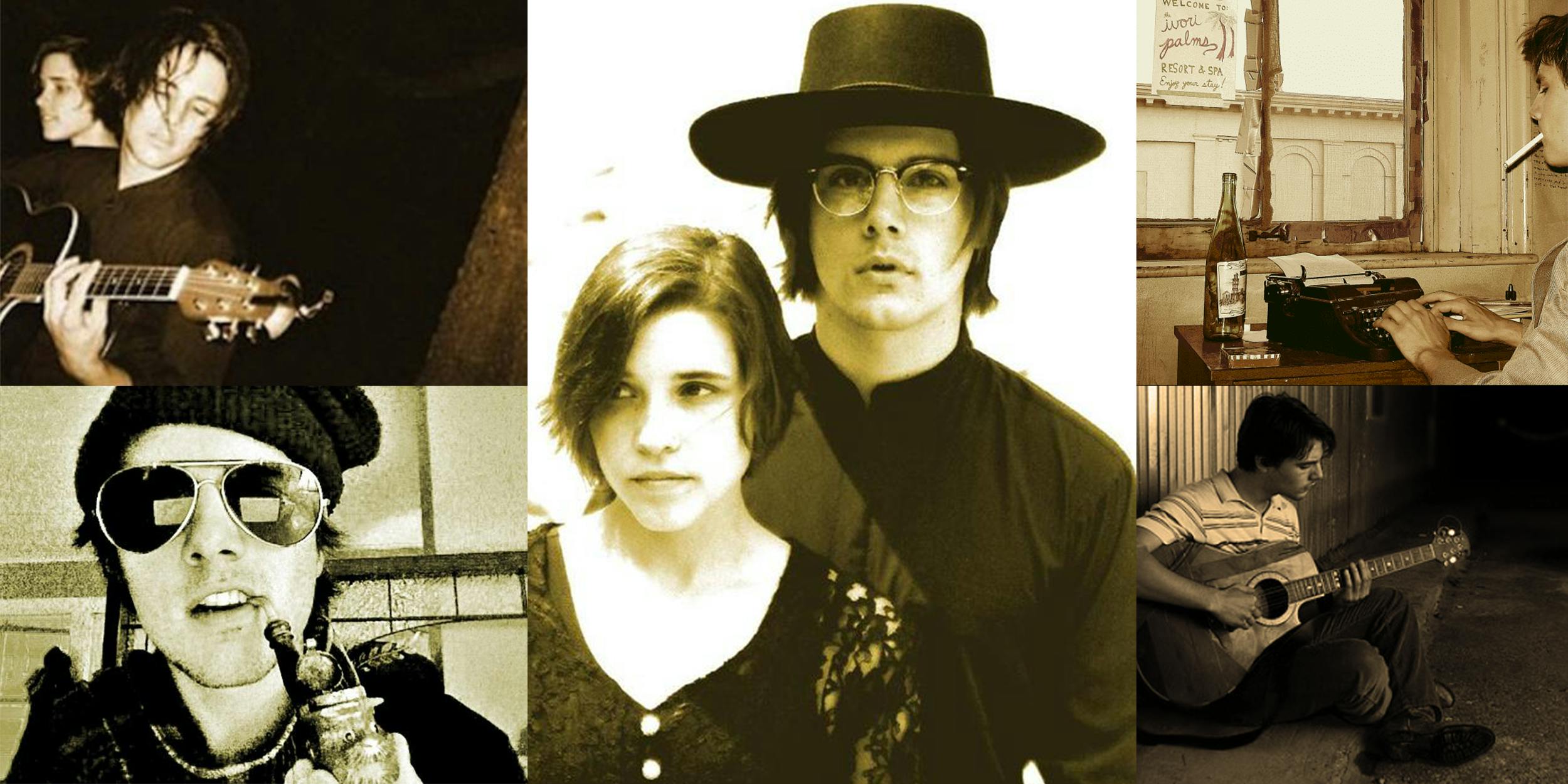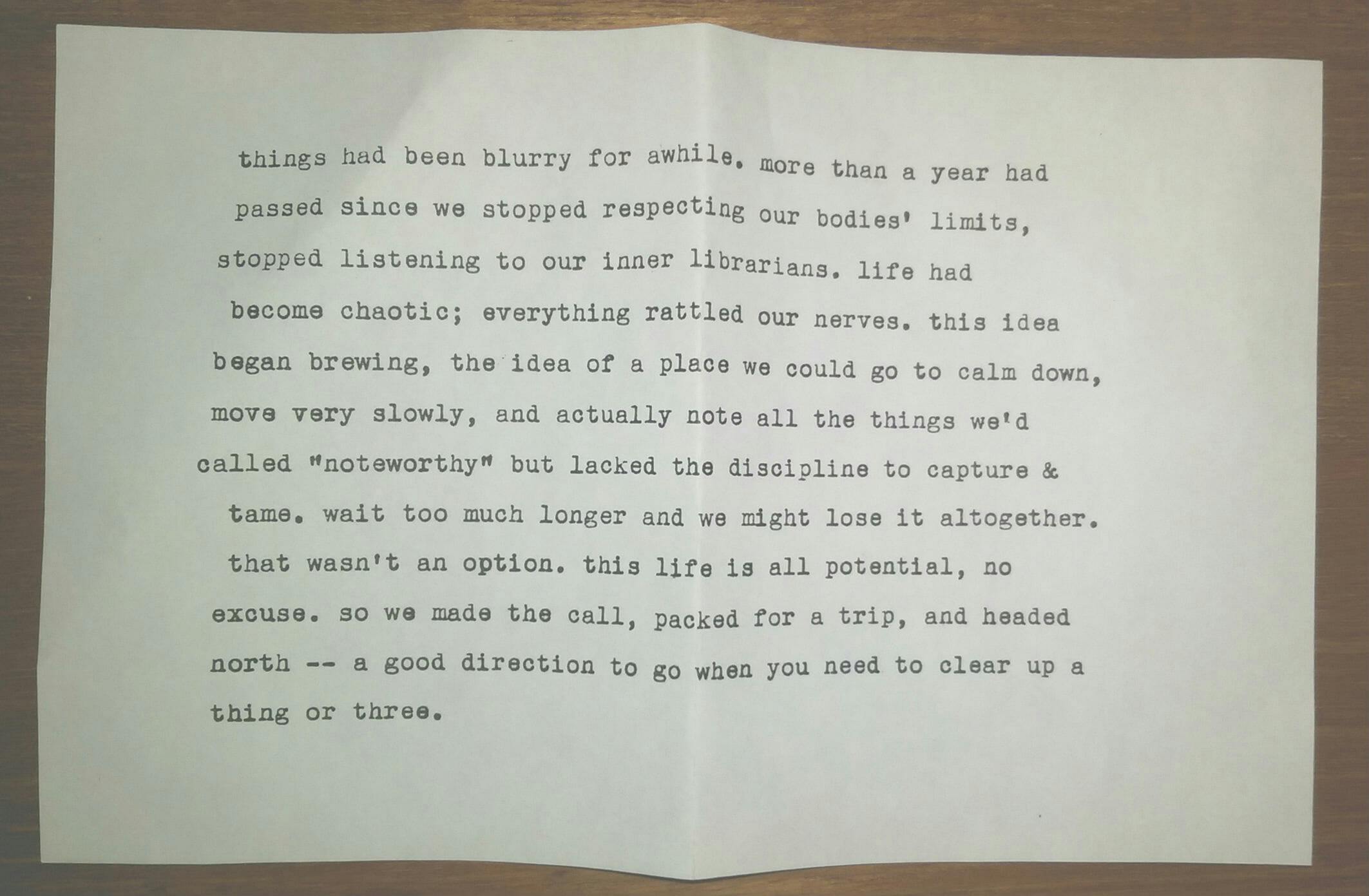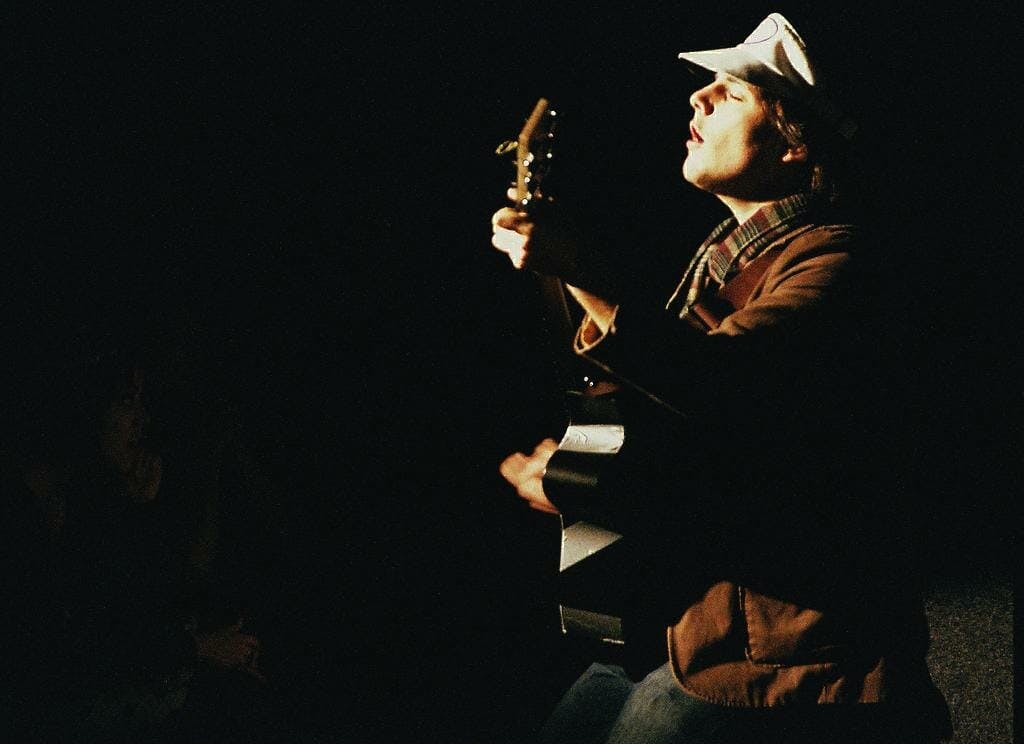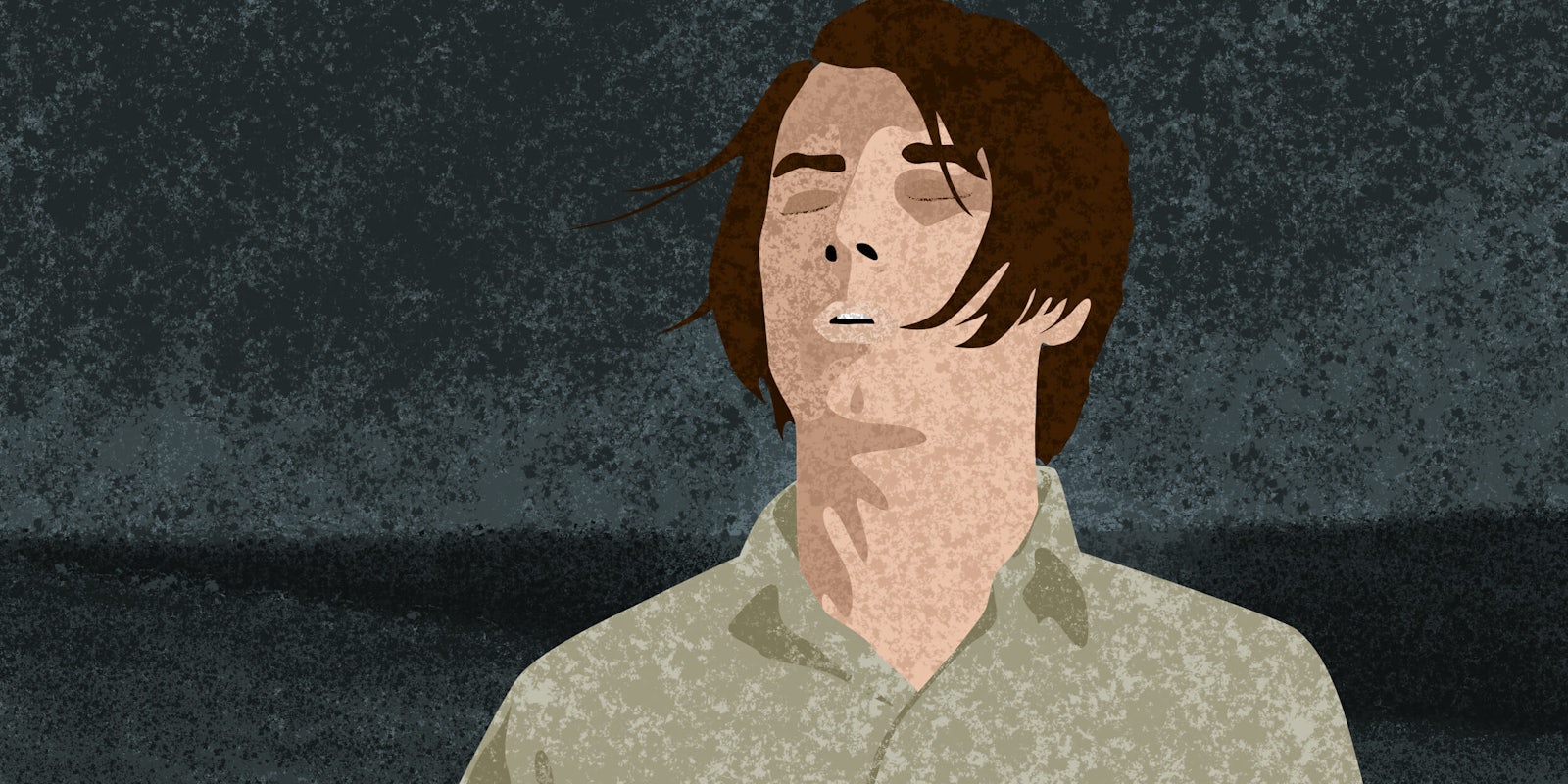Redding Hunter cast off from shore, a man in pursuit of his own myth.
It was the summer of 2006. Gas prices were high, Myspace was at its peak, and Hunter had a bold idea that capitalized on both. He planned to tour the East Coast by sailboat, traversing the Atlantic Intracoastal Waterway with fellow songwriters Jana Hunter and Ray Raposa of the Castanets in tow. For two weeks in August, the group intended to play 12 to 14 shows at various ports.
Under the moniker Peter & the Wolf, Hunter had already earned a reputation for hosting secret shows in unusual locations, like cemeteries and abandoned railroad cars. “It’s not like I try to find a graveyard in Boston ahead of time to play at,” he told me around that time. “It’s just something that happens. If someone tells me about a mental institution or something, my attitude has always been, ‘Well, let’s go.’”
In his songs and in his life, Hunter blurs the distinction between wandering and being lost. He toured at the time with what he called his “junk orchestra”—a ragtag group that accompanied him on tin cans, glass bottles, and whatever else was lying around—but more often than not, he ventured out alone, a traveling salesman with a small suitcase of handmade CDs: folded cardboard sheets and burned CD-Rs, adorned with pastel illustrations of fireflies and owls.
Hunter was the epitome of a DIY musician in the mid-aughts. He self-recorded all of his own material, released most everything through his own Whiskey & Apples label, and booked his own shows, often sleeping in his car when he couldn’t find a place to crash. He embodied the characters in his hazy, lo-fi folk songs: old souls and wayfaring strangers, chasing highways and lost loves, humming with mystery. Peter & the Wolf already had the attention of the most influential mp3 blogs of the era, like Gorilla vs. Bear, Daytrotter, and La Blogothèque, but the sailing tour offered national exposure, catching the attention of everyone from NPR and ABC News to Playboy.
“It was a great idea that hadn’t really been done before; that’s why the press latched onto it,” Daniel Gill, his publicist at the time and founder of the influential Force Field PR, tells the Daily Dot. “It generated enough press to put Peter & the Wolf on the map.”
The lookout didn’t see the buoy until it was too late. It was four in the morning, and the novelty of the tour had long worn off. Trips that would have only taken a couple hours by car were instead lasting days. Nerves were high, patience was thin, and the buoy was unwavering.
As the sailboat coasted into the Baltimore harbor in the Chesapeake Bay, the lookout tried to use the electronic system to steer the ship away instead of manually turning the wheel. He was merely a cameraman, there to document the tour, and before the actual captain could compensate, the buoy side-swiped the small boat, punching a hole into it. As water poured in, everyone scrambled to shore.
The tour was over.
…
It’s hard to separate Redding Hunter from the myth of Peter & the Wolf.
He arrived in Austin, Texas, at a time when the local indie music scene was reaching a boiling point. Spoon and Okkervil River had already established the city’s reputation, but 2006 also brought acclaimed debut albums by the Black Angels and the Sword, while bands like Voxtrot and Sound Team were dominating the national blog circuit. Hunter benefited from the scene but mostly existed outside of it, more interested in unchartered territory. His candlelit show on a tiny piece of land in the Colorado River called Snake Island, reachable only by canoe, still carries a sense of awe.

“It was very secret feeling and unbelievably magical,” recalls Dana Falconberry, an Austin songwriter.
“Looking back on it, I’m amazed that our canoe didn’t tip over once that night,” adds Jared Van Fleet, a close contemporary and former Voxtrot guitarist. “I [found his] approach to music inspiring. It never felt like it needed to be constrained to a ‘proper’ venue or context.”
Hunter’s a masterful storyteller and wayward romantic. His songs set scenes in soft focus, weaving picturesque details of hazy streams and bonsai trees with melodies that linger like lullabies. His proper late 2006 debut, Lightness, is a soundtrack-in-waiting, rippling with songs like the black-and-white piano ballad “Silent Movies,” restless “Safe Travels,” and knotted sea shanty “Dear Old Robyn” that leave you feeling like a day spent at the beach, the pull of the ocean swirling in your chest.
“I really think Red is some sort of weird genius,” says Falconberry, whose amber vocals appear on most of Hunter’s best work. “His command of melody and lyric seem effortless, in that way that makes it look less like he’s working out a rhyme scheme or chord structure and more like he’s extracting something ancient and important from the air itself.”
Just when it seemed Peter & the Wolf was poised to break through, Hunter bolted from the spotlight. He botched his highly anticipated showcase performance at the South by Southwest Music Conference in March that year, reportedly taking a tequila shot for every song played. (“The charitable thing to do would be to not review the Peter & the Wolf showcase because any review would have a hard time being charitable,” opened the Austin Chronicle’s report.)
Hunter ditched town not long after, squatting in a warehouse in Canada for close to a year to work on his next record and first novel, both called The Ivory Palms. There’s a photo of him on the inside cover sitting at an old typewriter, a cigarette dangling from his lips. It’s a romanticized image, in faded sepia tones, like Hunter S. Thompson in Puerto Rico, except the window is sealed with duct tape and there’s a drawing of palm trees on the glass—an island resort of his own imagination. It’s as if he never returned.
“My guess is that the music that is coming out of them is so pure and fragile and vulnerable, they have to hide from it in some way,” offers Falconberry, speaking more generally about artists who retreat from their own success. “It’s just too much to face an audience with that every night.”
Gill puts it in more black-and-white terms. “He didn’t put out a proper follow-up to Lightness within a reasonable amount of time and had a falling out with his label (the Worker’s Institute).”
Plenty of indie acts of that era went boom or bust, mostly the latter, as mp3 blogs hyped them to unsustainable levels and unrecoupable major label advances. It was a unique time in music history, when the right Pitchfork review could catapult an unknown act onto the national festival circuit and sell thousands of records overnight. But Hunter’s music never fit under the much-derided “blog rock” banner applied to bands likes of Clap Your Hands Say Yeah or Tapes ‘n Tapes. His songs bore a sense of permanence, as if they had always been there—like forgotten traditionals from Alan Lomax’s field recordings, timeless yet mysterious.
And he kept recording. In December 2011, Hunter released Easy Mountain, a quiet masterpiece, on Bandcamp. It’s his most complete work to date, full of startling moments of simple beauty and somber reflections. Imagine what Neil Young’s On the Beach might’ve sounded like if it had actually been recorded on one. There’s a loose narrative at work, one that yields some insight into where he’d been, teased in an excerpt that accompanied mail-order copies—or at least the one I received—about a man who needs to head north, “a good direction to go when you need to clear up a thing or three.”
“Rosario,” the lead track, sets the scene:
I’m living the dream
Swimmin’ in the stream
Runnin’ off of steam, I know
Excuse me, I’ve got to go.
Falconberry doesn’t let him off that easy:
Always said you were a crazy fool
You got lost out there, didn’t you?
Couldn’t find you if I wanted to
Ain’t that the truth?
The album arrived like a message in a bottle, washed ashore without context, a fading reminder that he’s still out there somewhere.
“I won’t return until I am a better man,” he pledges in “Sure I See the Sun.” A decade after his brush with national acclaim, would anyone notice if he did?

…
Hunter is easy enough to track down—he’s on Facebook and Twitter, though he rarely posts. There’s just no telling where he might be calling home when you find him, or if he’ll be willing to talk.
When I finally reach him by phone, he’s back in Austin, staying in the guest house of a friend who’s on tour for the next few weeks; he’d just picked up a Jazzmaster from the local Guitar Center and finished another all-night editing session. He’s in a rare talkative mood—he’ll clarify later a week later, when he declines to answer my follow-up questions—and it shows in his delivery. He’s coming down, his thoughts jumbled, fraying.
“I go crazy here knowing my days are numbered; I can play music here all day and night and not bother anyone,” he says. “As soon as I leave, I don’t know what I’m going to do.”
He’s not exaggerating, but he doesn’t seem too concerned, either. He’s been down this path before, and he’s never been one to focus on the destination.
“I kinda think it’s easiest if I think of myself as living in a couple of places, so I don’t ever feel like I’m leaving,” he says. He’s been subletting for the last four years, splitting his time mostly between New York and California, and he travels lightly, selling almost everything he owns, save for a backpack with a few personal effects and a ProTools install disc, before he leaves each city. You can tell he takes comfort in knowing he can fit everything in the trunk of a car, that he can leave on a moment’s notice.
“I get repulsed by stuff,” he says. “There’s something about accumulating things that wears me down. Physical objects… I’ve got enough problems with my body changing over time, I don’t need a bunch of junk weighing me down too.”

Hunter confirms that after Lightness, his relationship with his label deteriorated quickly. Lawyers were involved. The ordeal, which played out mostly while he was in Canada, left him exhausted and disgruntled with the industry. He burnt out on the road, too.
“You only get so many nights of slumming on strangers’ couches before you exhaust the part of you that’s into that. It was awesome, but at some point, you’re like, ‘I’ve done this drug before. I get it.’
“I got sick of being in a position where I was half musician and half bum. I never really made money, not enough to stay in hotels or anything. I won’t tour anymore in a way where I have to bum favors.”
With time, he felt his splendor of youth slip away.
“When you’re not in your 20s, you can’t sleep in your car. Nothing may have changed about you, but it’s no longer acceptable; you no longer have that permission slip from society. You’re a creep. I’m an adult man, not a wide-eyed kid, and you’re expected to not be curled up in the backseat of your car. It’s an entirely different experience when the cop knocks on your window.
“Without even wanting to, I started making concessions.”

Hunter may travel lightly, but there’s still baggage. He’s carrying the weight of his past, curious how things could’ve played out differently—with friends, lovers, his career, all of the things he left behind as he bounced from town to town.
“If I had been a different kind of person, I could see these pivotal moments where I could’ve gone to the next level,” he says. “But I don’t really want to be a person who spends most of their time playing the same set of music over and over. I think the weird sabotaging things I did was to spare myself the boredom.”
He’s still publishing new music, but under his own name and on his own terms. He contributed the closer to Red Hot’s exceptional 2014 tribute to Arthur Russell, Master Mix, and with little notice and even less fanfare, he released a flurry of new music on Bandcamp earlier this year: two collections of demos and two tracks from his stellar soundtrack to Long Nights Short Mornings, a 2016 indie drama by Chadd Harbold (now on Netflix) about an aimless New Yorker and his cracked relationships, which he’s considering officially releasing.
He seems adrift online, though, with a labyrinth of dead links, a forgotten Myspace, and a competing Peter & the Wolf on iTunes. The Dolphin King, a surrealist concept album about a Japanese samurai he uploaded in February, is only available to download on Bandcamp for an inexplicable $401.
He’s slowly getting around to making his music available on Spotify. Having lost most of his original early recordings, he’s re-recording, mixing, and mastering all of his old material, and his perfectionist tendencies have stalled the process. “I wish I could just go remaster everything, but it opens up this Pandora’s box,” he says. “I’ll think something is done and then a week will go by and I’ll do it all over again.”
Hunter’s uploaded only five tracks to date, each released as a single, a smartphone obscuring his face in the cover photo: “I want my music to go out to Spotify so that it can just circulate and go out into the wild.”
But Hunter’s focused primarily on film scores. He’s working on his third, an unnamed project he says will also involve him helping one of the actors who’ll be playing a musician.
“It’s real money,” he says. “It’s like a job. The cool thing about working with films is that you really take your game up. You can’t deliver anything lo-fi shit. You have to get it together. Using the same stuff I’ve always used, just my computer and a couple of instruments, I can make everything sound so much better now.”
What he’s not interested in is chasing the narrative anymore, in touring or finding the right pitch for his records—in maintaining his myth.
“It was pretty easy to make that no longer be a thing,” he says. “As soon as you decide you don’t want that, it all just falls, like someone juggling eight balls and letting them drop.” He pauses for a moment. “The world will move on without you.”

…
I worry Hunter’s music will get lost out there, in the craggy outer limits of the web.
In the same way that the internet vastly improves our ability to connect but can leave us feeling more alone, the joy of discovering music has dimmed in recent years, in part because we’re so inundated by new artists and tracks.
It’s easier than ever to find new music: Spotify curates a custom weekly playlist for each user based on their listening habits, Pandora slips in new tracks to its stations based on song metadata, and big data companies like Next Big Sound mine YouTube views and Wikipedia searches to identify trending artists. But the streaming experience also ensures we slip effortlessly into the next song or related video without acknowledgment or discern, outside of perhaps a thumbs up or down, an act that conditions algorithms to give us more of what we already know. There’s no click when the needle hits that innermost groove, no pop of the play button when you reach the end of the cassette deck. The beat goes on forever.
I can’t help but wonder about what I’m missing, or rather who, those at the fraying ends of the internet, obscured in all of those ones and zeroes. The artists like Hunter who no longer feel the need to tour to promote a record or simply see the barriers to entry of the modern web and wander off in the other direction.
“One day I’m going to put a record out online, and it’s going to be the best thing I’ve ever done,” Hunter says. “I like the idea of sneaking it out there, almost despite itself. If it’s good, it’ll make its own path. If it’s not, it’ll just sit there in the void.”
It’s as if Hunter’s hosting another one of his secret shows, tucked away on the vast coastlines of the internet, alone—still waiting to be found.


